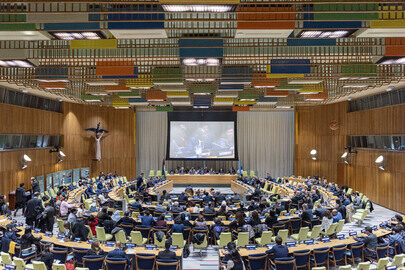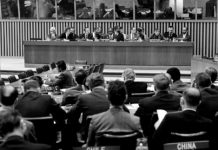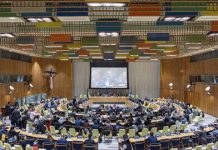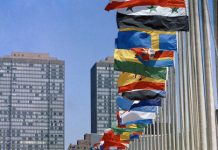“How has the UN lived up to expectations,” asked Mr. Jaishankar, pointing to the conflicts in Ukraine and the Middle East, as well as West Asia and “innumerable hotspots” which “don’t even make the news.”
The minister decried a perceived lack of global solidarity on a number of issues: he described the slow progress of the Sustainable Development Goals (which are way off track for completion by the 2030 deadline) as “a sorry picture,” condemned the “recirculated commitments and creative accounting” that, he said, pass for climate action, and accused wealthy countries of insulating themselves energy and food insecurity, whilst resource-stressed nations “scramble to survive only to hear sanctimonious lectures thereafter.”
Global economic concerns include “tariff volatility and uncertain market access,” argued the minister, technological control, supply chain and critical minerals, the protection of sea lanes and restrictions on the evolution of a global workplace.
These issues point to a need for more international cooperation, he suggested, whilst questioning the UN’s ability to solve them. Mr. Jaishankar declared the UN is “in a state of crisis,” and gridlocked, partly due to a resistance to reform even though most members want change. “It is imperative that we see through the cynicism and purposefully address the reform agenda,” he declared.
Facing up to terrorism
In a reference to ongoing disputes with Pakistan, Mr. Jaishankar asserted that, for several decades, major international terrorist attacks have been traced back to India’s neighbour.
He said that India exercises its right to defend its people against terrorism and bring its perpetrators to justice. Fighting this threat, he said, is an area where much deeper international cooperation is needed, and relentless pressure put on the whole terror ecosystem.
India’s ‘duty to contribute’
Mr. Jaishankar went on to portray India as a leader in the Global South, responsible for more than 600 development projects in 78 countries. The country, he said, steps forward to respond to the urgent needs of other countries, whether in terms of “finance, food, fertiliser of fuel.”
He gave the example of the emergency aid India provided after the 2024 Afghanistan earthquake, and the more recent earthquake in Myanmar, and the contribution that India makes to peacekeeping, providing troops as blue helmets in conflict hotspots from the Golan Heights to Western Sahara and Somalia.
‘Islands of prosperity cannot flourish in an ocean of turbulence’
The minister then lauded the economic achievements of his country, particularly over the last decade. He mentioned the Indian start-up ecosystem, rapidly growing infrastructure and commitment to harnessing artificial intelligence responsibly.
India’s approach, explained Mr. Jaishankar, can be summed up as self-reliance, strong security, and the self-confidence of a rapidly growing major economy.
He concluded with a call for the ninth decade of the UN to be one of leadership and hope. “International cooperation must prevail because islands of prosperity cannot flourish in an ocean of turbulence.”
Source of original article: United Nations (news.un.org). Photo credit: UN. The content of this article does not necessarily reflect the views or opinion of Global Diaspora News (www.globaldiasporanews.net).
To submit your press release: (https://www.globaldiasporanews.com/pr).
To advertise on Global Diaspora News: (www.globaldiasporanews.com/ads).
Sign up to Global Diaspora News newsletter (https://www.globaldiasporanews.com/newsletter/) to start receiving updates and opportunities directly in your email inbox for free.




























